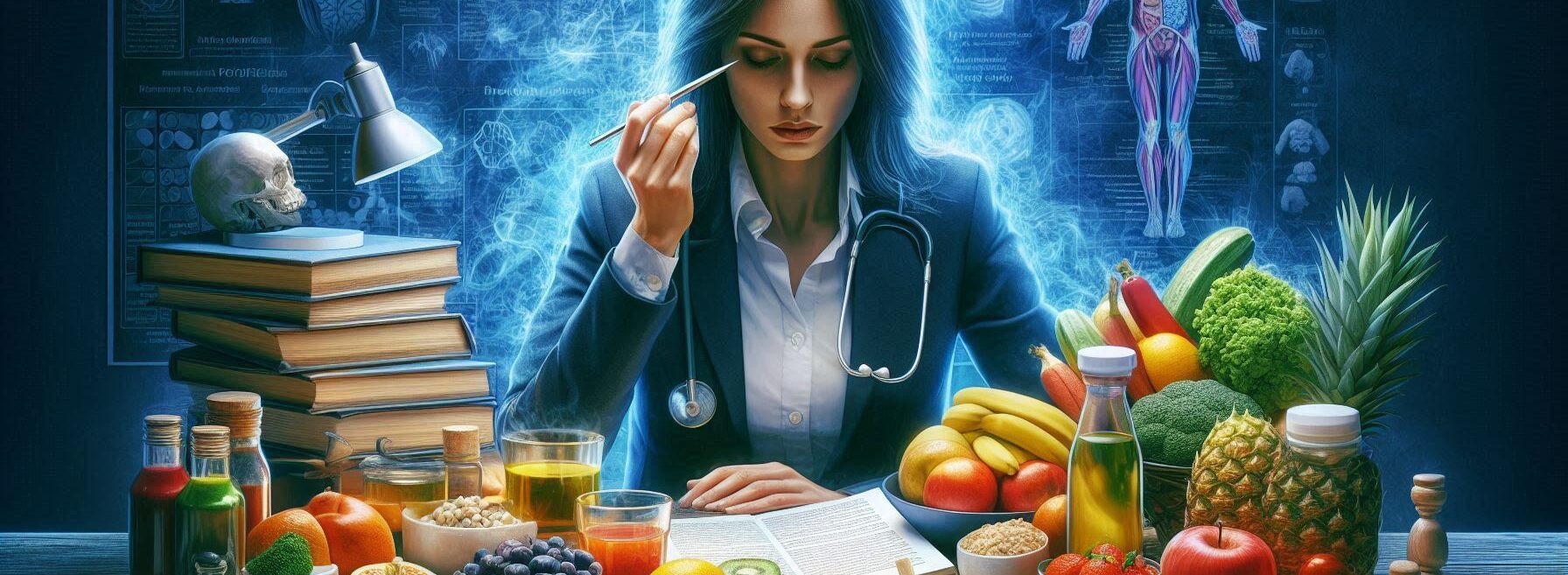Let’s face it: when we think about mental health, our minds often drift toward therapy sessions, medication, or those awkward moments where you try to explain your feelings to a friend who just wants to talk about their cat.
But what if I told you that the food on your plate could play a starring role in how you feel? Yes, folks, nutrition isn’t just for bodybuilders and people trying to impress others at brunch; it’s also crucial for mental health!
Top Takeaways and Key Concepts
- Prioritize nutrient-rich foods like salmon, leafy greens, and nuts daily.
- Limit processed foods and sugary snacks to stabilize mood and energy.
- Include vitamins and minerals, especially B vitamins, magnesium, zinc, and vitamin D.
- Support gut health by eating fiber-rich fruits, vegetables, and fermented foods.
- Practice mindful eating and stay hydrated to enhance mood and mental clarity.
This text emphasizes the strong link between nutrition and mental health. It explains how nutrient-rich foods, vitamins, and minerals directly support mood regulation and cognitive function, while processed foods can increase anxiety and depression. Gut health is highlighted as a critical factor, with fiber feeding beneficial bacteria that improve emotional well-being. Mindful eating practices and proper hydration further enhance mental clarity and emotional stability. Overall, adopting a balanced, nutrient-dense diet combined with mindful habits can significantly boost mental health.
Food as Fuel for Your Mood
Please Note: This post may contain affiliate links. If you click one of them, we may receive a commission at no extra cost to you. As an Amazon Associate, I earn from qualifying purchases.

Imagine your brain is like a high-performance sports car. Now picture feeding it nothing but low-grade fuel from the sketchy gas station down the street.
How well do you think that car would run? Not great! The same goes for our brains. The foods we eat directly affect our mood and energy levels.
By the way, ever notice how after devouring a whole pizza (because who doesn’t love pizza?), you might feel an immediate wave of happiness followed by a deep existential crisis as you contemplate your life choices?
That’s not just guilt talking; it’s your brain crying out for nutrients! Foods rich in omega-3 fatty acids—like salmon—are known to boost mood and reduce symptoms of depression.
So next time you’re eyeing that slice of cake, consider swapping it out for some fish instead. Your brain will thank you!
Interestingly enough, studies have shown that diets high in processed foods can lead to increased rates of anxiety and depression. It’s almost like eating junk food is sending your brain on a rollercoaster ride through Crazy Town without a seatbelt!
The Power of Vitamins and Minerals
Now let’s dive into vitamins and minerals—the unsung heroes of our diet! These little guys are like the backup dancers at a concert; they may not be front and center but boy do they make everything better!
Nutrients like B vitamins, magnesium, zinc, and vitamin D play significant roles in maintaining good mental health.
For instance, did you know that B vitamins are essential for producing neurotransmitters? You know those little messengers that help regulate mood? Yeah, they’re kind of important!
A deficiency in these vitamins can lead to fatigue and irritability—so if you’ve been feeling cranky lately, maybe it’s time to check what’s happening in your fridge rather than blaming your coworker who keeps stealing your lunch.
Speaking of which, magnesium is another rockstar nutrient often overlooked. This mineral helps combat stress by regulating cortisol levels—the hormone responsible for that lovely fight-or-flight response we all love during stressful situations (insert sarcasm).
If you’re feeling overwhelmed more often than not, consider adding some leafy greens or nuts to your meals. Who knew salad could be so powerful?
Gut Health: The Surprising Connection
Here’s something that might blow your mind: did you know there’s a connection between gut health and mental health? It turns out our intestines are sometimes referred to as our “second brain.” Yep! Those tiny critters living in our digestive system actually influence how we feel emotionally.
Let me break this down: when we eat fiber-rich foods like fruits and vegetables (you know—the stuff we’re supposed to eat), we feed the good bacteria in our gut.
These happy little microbes produce short-chain fatty acids which have been linked with improved mood and cognitive function. On the other hand, if you’re munching on chips every day while binge-watching reality TV shows about people trying to find love on an island—well—you might end up feeling more “meh” than marvelous.
So next time someone tells you they’re going on a “gut cleanse,” don’t roll your eyes too hard! They might actually be onto something beneficial—not only for their digestion but also for their mental state.
Mindful Eating: A Recipe for Happiness
Okay folks, let’s chat about mindful eating because honestly? It deserves its own spotlight! In today’s fast-paced world where dinner often consists of shoveling food into one’s mouth while scrolling through social media feeds (guilty!), taking time to appreciate what we eat can seem impossible.
But here’s the thing: being present during meals allows us to savor flavors while recognizing how certain foods make us feel afterward.
Ever had that moment when you realize after scarfing down an entire bag of chips that maybe this wasn’t such a great idea? Mindful eating encourages us to listen closely to our bodies’ cues instead of mindlessly munching away like zombies searching for brains!
To be fair though—and I mean this sincerely—it takes practice! Start small by dedicating one meal each day where distractions are turned off (yes—even put down your phone) so you can truly enjoy every bite without racing against time or Netflix episodes.
Hydration Nation: Water’s Role
Lastly—but certainly not least—is hydration because water is essential not only for physical survival but also plays an important role in keeping our minds sharp!
When dehydrated—even slightly—we can experience fatigue, headaches…or worse yet—a general feeling akin to trudging through molasses with weights tied around our ankles.
Think about it: water helps transport nutrients throughout the body—including those wonderful ones mentioned earlier—and keeps everything functioning smoothly (like flushing out toxins). So grab that water bottle right now because staying hydrated could keep those pesky depressive thoughts at bay!
In fact—let’s see—next time you’re reaching for soda or sugary drinks instead remember how refreshing plain old H2O feels once quenched properly…and bonus points if it’s served with lemon slices because fancy!
Conclusion
In conclusion—or should I say “food-lusion”?—nutrition plays an undeniably vital role in mental health management.
By making informed choices regarding what fuels us physically AND mentally while embracing mindfulness along the way—we can take significant strides towards improving overall wellness amidst life’s ups-and-downs!
Suggested External Resources:
Nutrition & Mental Health
https://www.psychologytoday.com/us/blog/the-healthy-mind/201803/nutrition-mental-health
The Link Between Diet and Mental Health
https://www.healthline.com/nutrition/diet-and-mental-health
Gut-Brain Connection
https://www.ncbi.nlm.nih.gov/pmc/articles/PMC6360557/
Frequently Asked Questions
How does nutrition affect mental health?
Nutrition influences brain function, mood regulation, and energy levels. Nutrient-rich foods support neurotransmitters, while processed foods may increase anxiety and depression.
Which nutrients are most important for mental well-being?
B vitamins, magnesium, zinc, and vitamin D are key for mood stability, stress reduction, and cognitive health. Deficiencies in these nutrients can worsen irritability and fatigue.
Can omega-3 fatty acids help with depression?
Yes. Omega-3s found in foods like salmon support brain health and may reduce depressive symptoms by improving neurotransmitter function.
How does gut health influence mood?
A healthy gut supports beneficial bacteria that produce compounds linked to improved mood and cognitive function. Fiber-rich foods help maintain this balance.
Why should processed foods be limited for mental health?
Processed foods and excess sugar can cause inflammation, mood swings, and energy crashes, contributing to higher rates of anxiety and depression.
What is mindful eating and how does it support mental health?
Mindful eating involves slowing down, savoring food, and noticing how meals affect your body. It helps reduce overeating, enhances satisfaction, and supports emotional balance.
Does hydration play a role in mood regulation?
Yes. Proper hydration supports nutrient transport, brain function, and mental clarity. Even mild dehydration can contribute to fatigue and low mood.

Kevin Collier is a passionate mental health advocate and writer for SadFAQ.com, where he explores the complexities of depression and mental well-being. With a deep understanding of mental health challenges, Kevin provides compassionate insights and practical advice to help individuals navigate their journeys toward healing. His articles aim to destigmatize mental health issues, offering support and resources for those seeking to improve their emotional resilience. Committed to raising awareness and fostering open conversations, Kevin’s work empowers readers to prioritize their mental health and seek the support they deserve.




